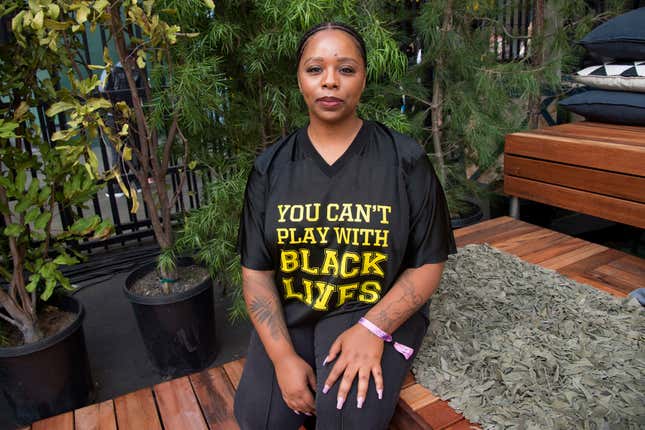
Since summer of 2020, Black Lives Matter has been in the spotlight for spearheading the movement against police brutality. However, the organization has drawn criticism due to a lack of transparency regarding their donations. Co-founder Patrisse Cullors spoke to The Guardian in an interview expressing not only how the backlash effected her but also how she became a part of BLM before the controversy.
Cullors told The Guardian her activism began at a young age after witnessing the way Black kids were treated by police. The disproportionate rate at which they were being arrested and imprisoned encouraged her to become an abolitionist which was only amplified further as more police brutality cases came to light over time.
From The Guardian:
It was in 2013, while she was transitioning to abolition work, that Cullors first tweeted the hashtag #BlackLivesMatter, after George Zimmerman was acquitted of murdering Trayvon Martin in Florida. Then came her call to action, alongside fellow activists Alicia Garza and Opal Tometi.
At first, she says, “we didn’t feel like owners of it. We didn’t call ourselves co-founders of BLM until like a year later. The only reason we started to call ourselves co-founders is because it started to be co-opted. It started to be Black men using BLM as a way to tell their message, which was largely anti-woman or often anti-queer and trans. Or devoid of the conversation of feminism. And we were like: ‘We’ve gotta intervene.’”
Despite her heart for wanting to heal the Black community, Cullors faced adversity amidst the controversies regarding BLM’s donations. Tearfully, she shared with The Guardian how the backlash impacted her. “I’m crying because I was prepared for rightwing attacks. I wasn’t prepared for Black people to attack me. And I think that’s probably the hardest thing in this position, to lose your own people,” said Cullors via The Guardian.
A New York Magazine article had outlined the number of criticisms BLM received following the release of the BLM Global Network Foundation finance report. Two mothers of police violence victims called on BLM to “stop capitalizing on their suffering,” and two Ferguson activists said the organization forgot about Ferguson and its historical significance for activism after being “catapulted into the limelight,” read the New York Magazine article.
From The Guardian:
But BLM had grown too quickly. “At a certain point,” she says, “people wanted to start giving us money and we didn’t have a legal infrastructure and we weren’t sure we wanted one.” Then George Floyd died under the knee of a policeman in the summer of 2020, and donations skyrocketed. BLMGNF took in just over $90m (£67m) that year.
Cullors and other BLM leaders have since come under intense scrutiny, with claims that too little of the money raised has reached those in need, while large sums have circulated around an opaque network of companies, some of them with links to Cullors.
In a New York Post story detailing her property purchases, it was suggested that some of BLM’s millions were pocketed by Cullors but was never proven to be fact. Cullors called the cyberbullying a campaign to get her assassinated. New York Magazine reported she resigned as BLMGNF’s executive director in May of 2021 shortly after the story was published. Cullors told The Guardian that managing as an executive director did not match her skill set of campaign building and organizing.
Though stepping away from the larger organization, Cullors said she aims to continue her activism locally, per The Guardian. “I was thrust into a global spotlight, but at the end of the day I’m a local community organizer. I can sustain local organizing work. I think being the face of a global movement was turning me into something I didn’t want to be. I didn’t want to be a shark,” said Cullors via The Guardian.

